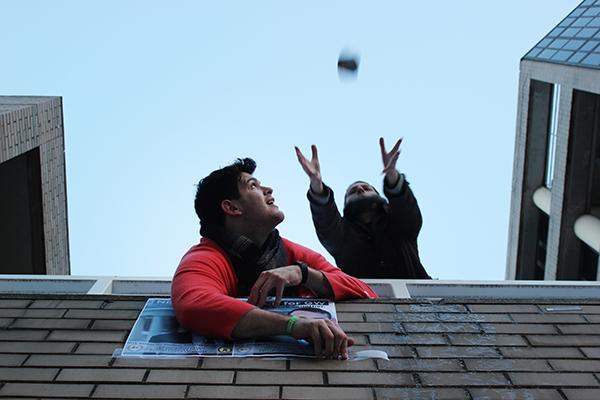The campaigns for Student Association executive seats this year are dotted with big promises: two free meals each day for students who live on campus, more multi-million renovations to Gelman Library and celebration days for Passover and gay pride.
But the platform points from the six executive candidates this year – four of whom have previously held SA positions – have not sparked fresh discussions on campus-wide ideas. This election steers away from the clear messages in previous years’ races, which have been dominated by big issues like student space, eliminating fees or improving health services.

Last year, SA executives Ashwin Narla and Abby Bergren hosted rallies and distributed petitions to make student space a tagline that was known across campus. The previous year, SA president John Richardson and his second-in-command Ted Costigan created a “fee task force.” In 2010, former president Jason Lifton worked with architects using a 10-foot long Lego model to design a new entrance floor in Gelman Library.
This year’s top candidates, Nick Gumas and Daniel Egel-Weiss, are both seasoned SA senators who have taken part in larger efforts, but neither has floated the kinds of big ideas that would require widespread student buy-ins before pitching them to administrators.
With close access to GW’s highest officials and the potential to jolt campus-wide initiatives, students vying for SA president are under pressure to deliver big goals.
Instead, this year’s presidential contenders proposed smaller initiatives – which both say are more achievable. Egel-Weiss wants to eliminate the $150 fee to rent a GWorld card-reader and create a weekly newsletter for student organizations, while Gumas wants to nix for-credit internship fees, create a peer counseling program and reform the SA annual retreat.
On the heels of multi-million dollar commitments for student-advocated projects, both presidential candidates’ plans are mostly cost-neutral.
Costs for SA initiatives have run deep in recent years:

– Renovations to Gelman Library, which were brought to the forefront of campus attention after Lifton lobbied for them in 2010, cost $16 million.
– The University also committed to $20 million over the next decade to expand the career services office, hiring dozens of staff members after multiple candidates campaigned on the issue.
– Administrators have pumped nearly $200,000 into the University Counseling Center’s budget over the last two years after cutting appointment fees.
– Last year, GW spent $200,000 to renovate part of the Marvin Center fourth floor after scrapping the Hippodrome bowling alley in 2011 to make way for office space.
In the last year, University President Steven Knapp also committed to relocating Student Health Service and the UCC, which will likely cost millions of dollars to turn existing space into a health center as part of a campus-wide shuffle. Knapp has not yet said where the offices will move, but SA president Julia Susuni said a task force will make the decision by May.
Abby Bergren, last year’s executive vice president, said larger initiatives, like their student space campaign, sometimes need to be passed down from administrations because change is slow.
“It’s important to realize the nature of the University administration is a very slow-moving body. It’s easier to accomplish smaller, more succinct goals than to follow these overarching decisions,” Bergren said.
Candidates for executive vice president also have laid out small-scale campaign points. While two of the four candidates suggested ideas around alumni engagement, all bring ideas that don’t meet the grandeur of past executives’ plans, like when current Executive Vice President Kostas Skordalos committed to increasing sexual assault awareness on campus.
Ian Crueldad, a junior transfer student, has been the exception in this year’s race for top SA seats. Crueldad said he wants to give out two free meals a day to students who live on campus, discount Metro rides and get student representation to the D.C. Council, though he hasn’t yet said how he would implement the goals.
“If an EVP is not ambitious enough, there is a high chance that he or she will not be able to accomplish those goals. They need something to drive their goals,” Crueldad said.
He is competing against junior and SA Sen. Chris Stillwell, ESIA-U, who wants priority registration for student veterans and new whiteboards for Gelman Library, as well as junior and Class Council member Paul Lisbon, who wants to expand community service opportunities. The fourth candidate, Avra Bossov, plans to increase networking opportunities with alumni, and increase the staff and hours for SHS.
Susuni said this year’s campaign period, which is about three weeks shorter than last year’s, also may have kept candidates from speaking with enough student organizations to generate a buzz around their topic of choice.
“Having more time to spend with the student body and student organizations to listen to what they have to say and to share your ideas is very important,” she said about the two-week-long campaign period. “But I think that the candidates do have a unique opportunity to be creative about the way that they connect with students.”







